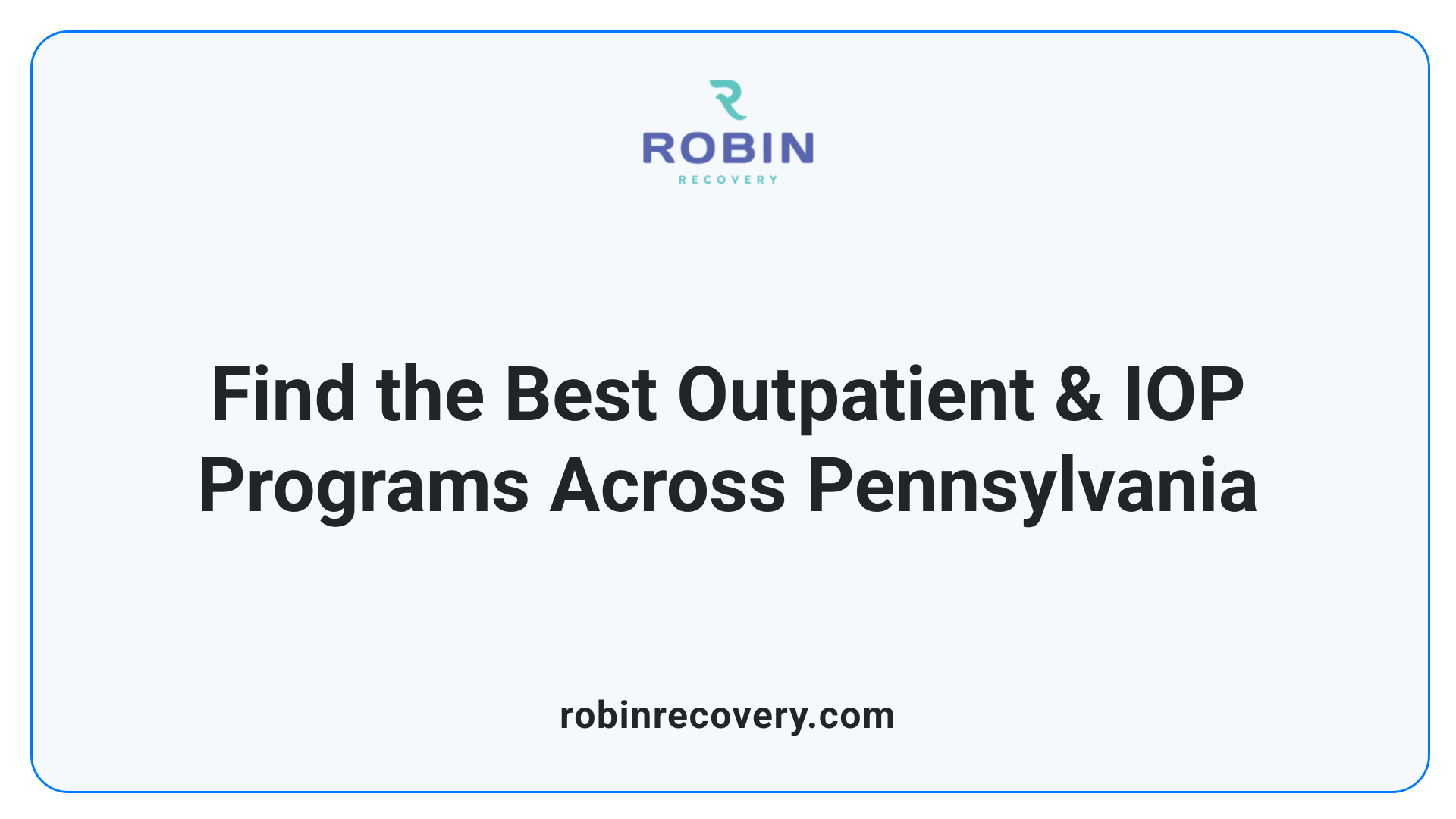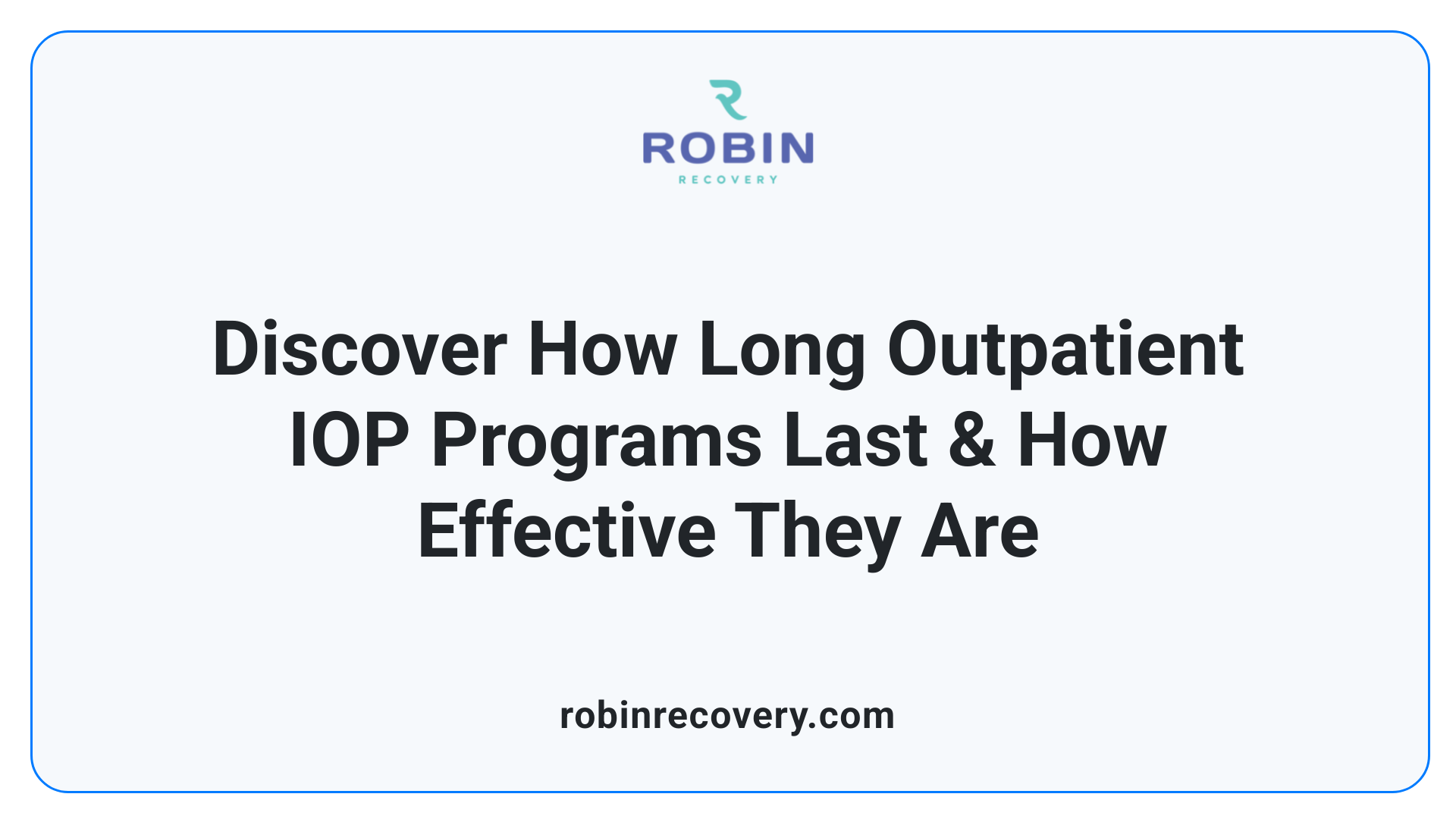Where Can I Find IOP Cocaine Treatment in PA?

Understanding Your Options for Cocaine Addiction Recovery in PA
Navigating the landscape of substance use disorder treatment in Pennsylvania can seem overwhelming, especially when seeking specialized outpatient programs like Intensive Outpatient Programs (IOP) for cocaine addiction. Fortunately, several reputable treatment providers across the state offer tailored outpatient services designed to meet diverse needs. This article explores the available treatment options, how to find suitable programs, the qualifications of providers, and regional resources to support your journey toward recovery.
Comprehensive Treatment Services for Cocaine Addiction in PA

What are the typical treatment options and services available for cocaine addiction in Pennsylvania?
Pennsylvania offers a broad spectrum of treatment options tailored to help individuals overcome cocaine addiction. These include detoxification processes, residential rehabilitation, partial hospitalization programs (PHP), intensive outpatient programs (IOP), and outpatient services.
Detoxification often serves as the initial step, helping patients safely manage withdrawal symptoms in a medically supervised environment. Facilities like Arkview Recovery and Peace Valley Recovery provide specialized detox programs with medical support and therapeutic interventions.
Residency programs offer intensive, structured treatment usually lasting from a few weeks to several months, focusing on stabilizing addiction and addressing co-occurring mental health issues. For those requiring less intensive support, PHP and IOP programs are widely available. These programs allow individuals to live at home while attending therapy and support sessions regularly.
PHPs, such as those at Stroudsburg and the Pennsylvania Recovery Center, provide rigorous daily treatment, including medication-assisted treatment (MAT) and psychotherapy. IOPs typically involve attending therapy several days a week for three-hour sessions, combining individual counseling, group therapy, and psychoeducational groups.
Evidence-based therapies form the core of these programs. Cognitive-behavioral therapy (CBT), motivational interviewing, and family therapies are commonly employed to modify addictive behaviors and strengthen recovery skills. Many centers, like Caron Philadelphia and Kolmac, incorporate holistic approaches such as art therapy, yoga, and nutritional counseling.
Medication-assisted treatment (MAT) is an important component in tackling cocaine addiction. While pharmacologic options are still evolving, some programs offer medications like Bupropion and Vivitrol® to support recovery. Combined with therapy, MAT enhances treatment outcomes by reducing cravings and preventing relapse.
Mental health support is integrated into nearly all programs, addressing depression, anxiety, or trauma that often accompany substance use disorders. This comprehensive approach ensures a more resilient recovery, with services provided by licensed professionals, psychiatrists, and counselors.
In conclusion, Pennsylvania’s addiction treatment landscape emphasizes personalized care, combining detox, medication, behavioral therapies, and mental health services. These integrated programs serve adults and teens, aiming to support lasting recovery from cocaine dependence.
Locating Outpatient and IOP Programs in Pennsylvania

Finding appropriate outpatient and intensive outpatient programs (IOP) for cocaine addiction in Pennsylvania can seem challenging, but numerous resources and structures are available to assist individuals seeking help.
Several types of outpatient services are offered across the state. Facilities like Penn Medicine provide medication-assisted treatment (MAT), which includes prescriptions like Suboxone to manage substance use disorders. Arkview Recovery offers personalized outpatient programs with holistic therapies, emphasizing community and individual growth. Peace Valley Recovery provides outpatient rehab options, including therapy for cocaine addiction utilizing evidence-based techniques such as Cognitive Behavioral Therapy (CBT).
To locate programs, Pennsylvania residents can make use of online directories and state resources. The Pennsylvania Treatment Atlas and Drug and Alcohol Facility Locator are valuable tools to identify licensed treatment providers. These platforms provide inspection reports, program types, and contact details, helping individuals make informed choices.
County drug and alcohol offices, or Single County Authorities, play a vital role in connecting individuals with locally available services. These offices can assist with assessments, funding options, and referrals, ensuring treatment is accessible and tailored to individual circumstances.
Common features of outpatient programs include structured group and individual therapy, family involvement, medication management, and psychoeducational groups. For example, Penn Medicine's programs offer comprehensive services staffed by experienced clinicians, while Arkview Recovery combines therapy with amenities such as fitness facilities and private rooms.
Funding often comes through insurance plans—most Pennsylvania providers accept major insurers like Aetna, BCBS, Cigna, and United Healthcare. Many programs are also eligible for state-funded assistance, including Medicaid and other subsidies, making treatment more obtainable for diverse populations.
To quickly connect with local options, individuals can call the 24/7 helpline 1-800-662-HELP (4357). This service offers live chat, text messaging, and personalized guidance for finding the right outpatient cocaine treatment program in Pennsylvania.
Summary of Outpatient Program Options in Pennsylvania:
Facility Name Program Types Offered Special Features Insurance Accepted Penn Medicine MAT, outpatient therapy Medication management, team of specialists Major insurance plans Arkview Recovery IOP, holistic therapies, detox, residential Amenities like gyms, private rooms Most major plans Peace Valley Recovery IOP, outpatient rehab Evidence-based therapies, family therapy Insurance, Medicaid Caron Philadelphia Outpatient, adolescent outpatient Family and trauma-focused groups Multiple insurances Kolmac IOP, outpatient, virtual and in-person support Over 50 years of experience, quick start options Most insurance plans
Utilizing these resources and understanding the program features can significantly facilitate access to quality outpatient and IOP services across Pennsylvania for those battling cocaine addiction.
Duration and Effectiveness of Outpatient IOP Programs

Most outpatient Intensive Outpatient Programs (IOPs) for cocaine addiction typically last between 8 to 12 weeks. This duration provides a structured period for patients to engage in therapy sessions, acquire coping skills, and establish a foundation for ongoing recovery. However, the length of treatment is often tailored to individual needs. Some patients may find they require additional support beyond the standard timeframe due to ongoing cravings, co-occurring mental health issues, or relapse risks.
Factors influencing how long an IOP lasts and its success include the patient’s level of motivation, the severity of addiction, support system strength, and presence of mental health co-morbidities. These elements help clinicians customize the care plan to optimize outcomes.
Research data indicates that IOPs for cocaine addiction are highly effective. Studies show that between 50% and 70% of individuals who participate in these programs achieve abstinence at follow-up points. Their success rates are comparable to inpatient or residential programs, particularly when participants are engaged actively and have access to ongoing support.
The role of continuous support and therapy components in these programs cannot be overstated. Many programs include individual counseling, group therapy, family involvement, and relapse prevention education. These components strengthen recovery by fostering motivation, accountability, and social reinforcement.
In summary, outpatient IOPs in Pennsylvania are designed to be flexible yet effective, offering a proven pathway for cocaine addiction recovery within a manageable timeframe. Their success depends significantly on personalized care, active participation, and ongoing support systems, making them a vital option for those seeking treatment.
Qualified Staff and Insurance Coverage for Outpatient Programs

What qualifications do staff and treatment providers have in outpatient cocaine treatment facilities in Pennsylvania?
Staff working in outpatient cocaine treatment centers across Pennsylvania are held to strict professional standards outlined by state regulations. According to Chapter 704 of the Pennsylvania Code and Title 28, Chapter 709, project and facility directors are required to hold at least a Master's Degree along with relevant experience or full certification as an addictions counselor. Clinical supervisors are typically expected to have similar qualifications, such as a Master's Degree or certification in clinical supervision.
Counselors within these facilities usually possess a Master's or Bachelor's Degree with appropriate clinical experience or are fully certified addictions counselors. Since July 1, 2021, all new hires performing treatment must obtain licensure or certification through the Pennsylvania Department of State or the Pennsylvania Certification Board. Additionally, counselor assistants are permitted under specific educational or experience criteria and must undergo supervised training.
Ongoing education is mandatory, with staff participating annually in training on topics like confidentiality, ethics, pharmacology, and evidence-based practices. State regulations also specify staff-to-client ratios and record-keeping protocols that all outpatient treatment staff must adhere to.
Are outpatient IOPs for cocaine treatment generally covered by insurance, including Medicaid?
Coverage for intensive outpatient programs (IOPs) targeting cocaine addiction often depends on the individual's insurance plan and provider network. In Pennsylvania, most major insurers—including Medicaid—are required by law to cover evidence-based addiction treatments, including outpatient services like IOPs, when deemed medically necessary.
The Mental Health Parity and Addiction Equity Act ensures that mental health and substance use disorder treatments receive coverage comparable to physical health services. Starting January 1, 2024, Medicare also began covering IOPs as part of its outpatient mental health benefits.
However, the specifics can vary—copays, deductibles, and whether a provider is in-network or out-of-network can influence coverage details. It is recommended that individuals consult with their insurance providers directly to verify benefits and understand their coverage options for outpatient cocaine treatment programs.
Additional Resources
For specific information about staff qualifications and insurance coverage for outpatient cocaine treatment programs in Pennsylvania, prospective patients and families can search for local programs using queries like 'PA outpatient IOP staff qualifications and insurance coverage.' This can lead to detailed provider profiles and up-to-date policy information, ensuring access to qualified treatment with appropriate financial coverage.
Regional Resources and Facility Information in Pennsylvania

Are there specific outpatient cocaine treatment options available for certain regions or cities in Pennsylvania?
Yes, Pennsylvania offers a variety of outpatient cocaine treatment options across different regions. In Philadelphia, Penn Medicine provides comprehensive outpatient programs that include medication-assisted treatment with drugs like Suboxone and a wide array of therapy services such as individual, group, and psychoeducational therapy.
In western Pennsylvania, organizations like Gateway Rehab deliver outpatient services, including medication-assisted treatment, in multiple locations, including Greensburg and Monroeville. These programs focus on evidence-based approaches tailored to individual needs.
Arkview Recovery, with centers in Mechanicsburg and East York, offers personalized outpatient care, including Partial Hospitalization and Intensive Outpatient Programs (IOP). These facilities accept various insurance plans to increase accessibility.
County agencies, known as Single County Authorities, play a vital role in Pennsylvania by providing assessments, funding, and referrals to local outpatient programs. This support helps ensure that individuals receive tailored treatment suited to regional demands.
Location Program Types Key Features Coverage Areas Philadelphia (Penn Medicine) Outpatient, IOP, PHP Medication, counseling, family support Greater Philadelphia Mechanicsburg (Arkview) Outpatient, PHP, IOP Personalized care, amenities Cumberland County East York (Arkview) Outpatient, IOP Holistic therapies, insurance accepted York County Greensburg, Monroeville, Wexford (Gateway Rehab) Outpatient, MAT Evidence-based therapies Western PA
This diverse range of regional programs ensures that residents across Pennsylvania have access to specialized outpatient options for cocaine addiction.
Empowering Your Path to Recovery in Pennsylvania
Finding the right outpatient program for cocaine addiction in Pennsylvania involves understanding available services, regional options, provider qualifications, and insurance coverage. Reputable centers like Penn Medicine, Arkview Recovery, Caron Philadelphia, and Peace Valley Recovery offer personalized, evidence-based outpatient treatments tailored to individual needs. By utilizing state resources such as county drug and alcohol offices, treatment directories, and insurance providers, individuals can confidently navigate the path toward recovery. Remember, accessible, quality care is available statewide, supporting every step of your journey to a healthier, drug-free life.
References
- Pennsylvania Treatment Locations | Pyramid Healthcare
- Intensive Outpatient and Outpatient Substance Use Treatment ...
- Premier Drug and Alcohol Rehab Programs
- Stroudsburg Outpatient Treatment Center - Pyramid Healthcare
- Intensive Outpatient (IOP) - Peace Valley Recovery
- Detox or Rehab in Pennsylvania? Call for Assessment
- Intensive Outpatient Treatment (IOP) - FSCAS
